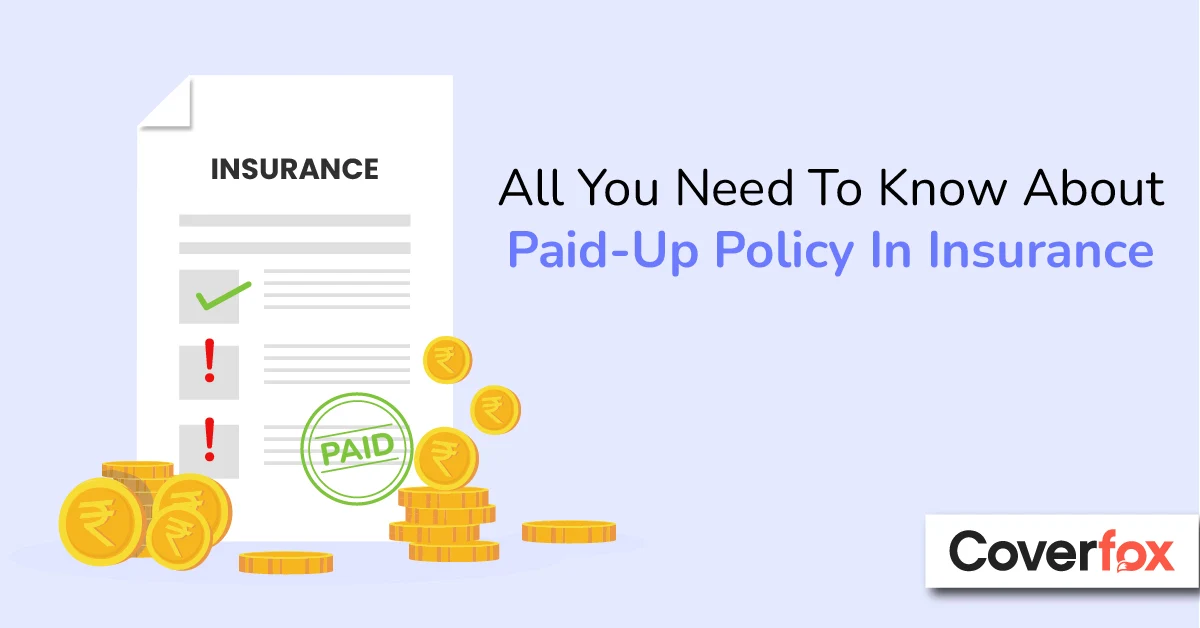When it comes to life insurance, there are many different types of policies available. One of these is a paid-up policy, which can be a valuable option for those looking for long-term financial security. In this article, we'll explore what a paid-up policy is, how it works, and why it may be a good choice for you.

What is a Paid-Up Life Insurance Policy?
A paid-up life insurance policy is a type of permanent life insurance that allows you to stop paying premiums while still maintaining coverage. This means that once you have paid a certain amount of premiums, you can stop making payments and still have a life insurance policy in place.
How Does a Paid-Up Policy Work?
A paid-up policy works by using the cash value of your life insurance policy to pay for future premiums. When you first purchase a life insurance policy, you will pay a premium each month or year to keep the policy in force. This premium is split between the cost of insurance and the cash value of the policy. Over time, the cash value of your policy will grow, and you can use this money to pay for future premiums. Once the cash value has reached a certain amount, you can stop making premium payments and your policy will be considered "paid-up."
What Are the Benefits of a Paid-Up Policy?
There are several benefits to having a paid-up policy, including:
- Lifetime Coverage: With a paid-up policy, you can have coverage for your entire life without having to make any more premium payments.
- Cash Value Growth: As mentioned, the cash value of your policy will continue to grow over time, providing you with a valuable asset that you can use for future expenses.
- Flexibility: A paid-up policy gives you the flexibility to stop making premium payments if your financial situation changes. This can be especially helpful during times of financial hardship.
- No Lapse in Coverage: With a paid-up policy, you don't have to worry about your policy lapsing if you miss a premium payment. As long as there is enough cash value to cover the premiums, your policy will remain in force.
How to Get a Paid-Up Policy
To get a paid-up policy, you will need to purchase a permanent life insurance policy, such as whole life or universal life insurance. These types of policies have a cash value component that grows over time, allowing you to eventually stop making premium payments.
Whole Life Insurance
One kind of permanent life insurance that covers you for the duration of your life is whole life insurance. Additionally, it contains a growing financial value component. With a whole life policy, you can choose to pay premiums for a certain number of years, such as 10, 20, or 30 years. Once you have paid the premiums for the specified time period, your policy will be considered paid-up, and you will no longer have to make premium payments.
Universal Life Insurance
Universal life insurance is another type of permanent life insurance that offers a cash value component. With a universal life policy, you can choose to pay premiums for a certain number of years, just like with whole life insurance. However, you also have the option to pay more or less than the required premium amount, as long as there is enough cash value to cover the cost of insurance. This flexibility can be helpful if your financial situation changes and you need to adjust your premium payments.
How to Maximize the Benefits of a Paid-Up Policy
To get the most out of your paid-up policy, there are a few things you can do:
- Pay Your Premiums on Time: To ensure that your policy is paid-up as quickly as possible, make sure to pay your premiums on time. This will help to build the cash value of your policy faster.
- Choose the Right Policy: When purchasing a permanent life insurance policy, make sure to choose one that fits your budget and financial goals. This will help to ensure that you can keep up with premium payments and eventually have a paid-up policy.
- Monitor Your Cash Value: Keep an eye on the cash value of your policy and make sure it is growing over time. If you notice that the cash value is not growing as quickly as you would like, you may need to adjust your premium payments or consider a different type of policy.
Conclusion
A paid-up policy can be a valuable option for those looking for long-term financial security. By understanding how it works and how to get the most out of it, you can make an informed decision about whether or not a paid-up policy is right for you. If you are interested in purchasing a paid-up policy, make sure to speak with a licensed insurance agent who can help you find the best policy for your needs.
Also Read: Prepare Yourself For Telemedical Interview Before Buying Term Insurance.
.jpg)

